grief
Our shared planet is crumbling under the weight of human greed and exploitation; our neighbors are being snatched up and disappeared from our communities; and money for jobs and education is being used to fund wars and genocide. And I’m expected to believe that God is good?
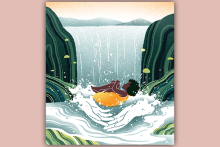
I WAS SWIMMING with friends in a creek when our host led us to a waterfall where a blanket of water dumped into a deep pool. The only way to get to the small cavern behind the fall was to swim below the churning surface. My friends dove under and popped up happily behind the curtain of water. I tried, but the water pounded my back and pushed me back to where I started. The next time, I approached it sideways and reached out my hand for a friend to pull me through.
This memory was fresh when I talked with Ashley M. Jones, poet laureate of Alabama. Her latest book Lullaby for the Grieving is a collection of poems that plumb the depths of grief over her father’s passing as well as grief for the horrors of slavery in American history and ongoing genocide in Gaza.
She told me the title came during a workshop that poet Palavi Ahuja led along the Sipsey River in western Alabama. After a hike, Ahuja asked participants to write a lullaby. For Jones, a lullaby is less about how to get to sleep, and more about “describing where you are ... where you could be and giving you a pathway to pause.”
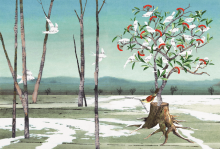
Many of us have made homes in religious traditions where we have found collective love, care, community-building, and resilience. But so much of what passes as spiritual in the United States — churches who only see their work as therapeutic, prosperity gospel proponents, white evangelical nationalists, New Age movements — is commodification by other means. John warns us against false prophets who, through quick fixes and distorted spiritual comforts, foster division and confusion in the service of lucrative self-aggrandizement.
I am an ordained minister in the Fellowship of Affirming Ministries, and I work as a movement chaplain in Los Angeles. I was trained as a spiritual director, and I have been doing ministry with faith-rooted activists since 2016. My work is informed by my primary training as a medical anthropologist and community researcher. I know that Jesus said that we humans are of more value than many sparrows, but I’ve found that we are a lot like them. We need refuge and sustenance. We need shelter. We need to nest somewhere. But with whom shall we do this for the short and long haul? And where shall we build our nests?
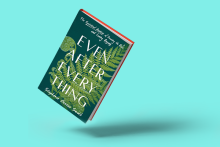
IF YOU WROTE down your past year’s most significant personal joys and losses on a timeline, how might they line up with the liturgical calendar — Advent, Christmas, Epiphany, Lent, Holy Week, Eastertide, and Ordinary Time? Placing these two calendars side by side, what might you find? Stephanie Duncan Smith digs into these questions in her memoir Even After Everything. For Duncan Smith — and likely for most of us — “Sometimes our personal moments converge with these natural and sacred seasons in profound, meaning-rich ways. And sometimes they clash with unbearable disparity.”
Duncan Smith shares her own story of loss and love with unflinching honesty, even and especially where it seems to clash with the Christian story. The places of dissonance are, for her, both a “dizzying problem” and a “place of divine encounter.” She invites us to dive into the dissonance with her as she wrestles out a sort of reconciliation — a renewed understanding of the Christian story that makes room, so much room, for every human grief. “The promise has never been smooth nor safe passage,” Duncan Smith writes. “The divine promise is presence.”
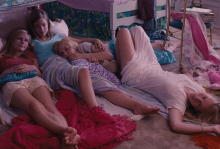
THE REMAINING LISBON sister are sprawled in their bedroom when the priest knocks on their door.
“Hello girls, I thought we could talk. Do you feel like talking?”
Their returning stares are vacant and unknowable, and the priest wears only the pretense of concern. Both parties maintain their false decorum, neither fully able to acknowledge their shared grief: the suicide of Cecilia, the youngest Lisbon sister, only 13 years old.
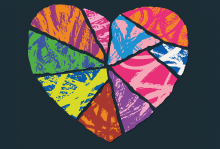
I RECENTLY HAD a conversation where I found myself feebly describing the pain of caring for an ill and aging parent. My wife, who is an exceptional curator of the emotional landscape, aptly identified my experience, my grief, as an “ache of the soul.” I find no better words for an experience so enveloping, so permeating through my body, my being, down to a cellular level — like a wave of loss that dredges the depths of the soul.
Grief can be complex and does not always begin with a terminal event. Surveyors of the human experience know well the “little” griefs that happen: the waning connection with the living; the loss of memory; the loss of energy and vitality. A once-doting parent who often inquired “Why haven’t you called?” no longer has the energy to do so. Meanwhile, whether relationships with our lost loved ones were good, complicated, or even nonexistent, the ache of the soul can be overwhelming.
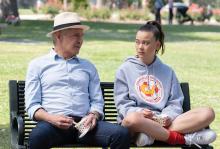
HOW WOULD YOUR life change if you stopped filtering your thoughts and instead shared what was really on your mind? This is the question at the heart of Apple TV+’s Shrinking, a tear-jerker of a comedy that follows therapist Jimmy (Jason Segel) and his teen daughter Alice (Lukita Maxwell), who is grappling with the loss of her mom and the emotional withdrawal of her grieving dad. In the months following his wife’s unexpected death, Jimmy turns to women and substance use to numb his pain. As Jimmy checks out of actively parenting, other people in Alice’s community step in — including the neighbor Liz (Christa Miller), who makes dinner for Alice and cheers her on at the soccer games her dad has forgotten. After a particularly flagrant parenting fail on Jimmy’s part, Liz confronts him, saying, “I have to ask: Is this you forever?” Jimmy’s response is relatable to many who have lost themselves in the wake of losing a loved one: “I don’t know.”
Yet with assistance from Liz, candid conversations with co-therapist Gaby (Jessica Williams), and unwavering friendship from Brian (Michael Urie), viewers watch Jimmy return to himself. And in the process, he breaches all guidelines about boundaries between patients and clients.
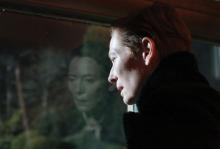
IN HER POEM “Flare,” Mary Oliver writes about grief and the relationship between memory and reality, especially when it comes to parents. She writes: “My mother / was the blue wisteria, / my mother / was the mossy stream out behind the house, / my mother, alas, alas, / did not always love her life, / heavier than iron it was / as she carried it in her arms, from room to room.”
Our relationships with parents are shaped by our memories, what parents tell us about their lives, and what we come to understand about them. The Bible tells us to honor our father and mother, but we can never do that perfectly because we never fully know them. This becomes more poignant when those who raised us are no longer around.
Like Oliver’s poem, Joanna Hogg’s The Eternal Daughter (available on video on demand) captures this liminal, lonely feeling in an intensely personal way. Hogg’s semi-autobiographical film is a ghost story about memory, family, and the pull between the stories we know, the ones we don’t, and unresolved ways they differ.
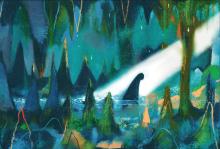
This spring, we’ll gather for a third time
since we first lost our forebears, martyrs to a cause
they did not choose for themselves.
Beloved grandmothers spent their last nights alone
in crowded hospital rooms while officeholders
deliberated over the what, not the what now or the how.
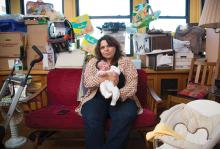
“WHERE WILL THE Judaica go?” a friend asks Judith Helfand, in reference to the material objects of her faith. Helfand is an Ashkenazi Jewish documentarian who turns the camera on herself and her family to tell larger stories. Here, she’s telling a story of becoming a “new old mother” the year after her own mother dies. She takes a deep breath of her newborn daughter’s hair and turns to her friend, who is trying to help her store and organize the too many things in her New York apartment. “That is such a good question,” replies Helfand, who embraced motherhood by adopting at age 50. “It’s the age-old Jewish question,” she continues. “Once we left the desert we were like, s---, now we have to find places for our stuff!” She breaks into laughter, that special laugh of the sleep-deprived and overwhelmed new parent, and never answers her friend’s question directly.
Love & Stuff, a POV documentary available on PBS, based on Helfand’s shorter New York Times Op-Doc with the same name, is full of age-old questions about holding on and letting go. Love & Stuff doesn’t offer easy answers or quick fixes, instead revealing the struggles and choices we make in curating our living spaces.

Whatever the cause of the loss, the result is uniquely painful but universally true: We’re left to pick up the pieces amid waves of grief, while those around us struggle to know what to say — a struggle that dates back to biblical times.
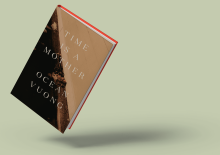
IN OCEAN VUONG'S latest collection Time Is a Mother, the T.S. Eliot Prize-winning poet reaches for depths of what was lost.
We encounter Vuong submerged in profound and compounding grief after the death of his mother. The book’s epigraph from César Vallejo reads, “Forgive me, Lord: I’ve died so little,” touching on the guilt that can accompany those left behind after a death. These poems hold the tension between looking back and moving forward, with the awareness of someone acquainted with feelings “that made death so large it was indistinguishable / from air,” as Vuong writes in “Not Even.” Those grieving search for comfort, while also examining life before loss—sometimes recognizing that grief was always present.
Time Is a Mother is full of questions that reckon with these past experiences. One of the first poems asks, “How else do we return to ourselves but to fold / The page so it points to the good part.” Other verses ask, “What if it wasn’t the crash that made us, but the debris?” and “How come the past tense is always longer?”
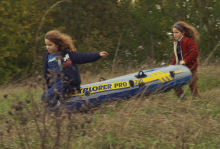
OVER THE LAST year we’ve had to reconsider our definition of what makes a “sacred space.” When churches and temples closed due to the pandemic, our homes became places of worship for many of us.
This cemented what’s always been true: Sacred space is a fluid thing. It can be a place of deep personal meaning or shared memories with people we care about. A sacred space doesn’t even need to be a physical location. It could also be the spiritual space created whenever we’re with those we love or remember people we’ve lost.
Céline Sciamma’s tender film Petite Maman speaks to this. A little girl, Nelly (Joséphine Sanz) and her mother, Marion (Nina Meurisse), grieve the death of Marion’s mother and clean out Marion’s childhood home. Sciamma’s movie becomes a meditation on everyday sacred spaces, including those that can exist within mother-daughter relationships.

Shannon Dingle is a disabled activist, sex trafficking survivor, and author of recently released Living Brave. Her family’s grief over the sudden death of her husband, Lee, in July 2019 resonated with many worldwide. She discussed Living Brave with Liuan Huska, author of Hurting Yet Whole: Reconciling Body and Spirit in Chronic Pain and Illness.
LIUAN HUSKA: IT’S been almost two years since a rogue wave killed your husband, Lee, on a family beach vacation. You wrote about his death soon after it happened.
Shannon Dingle: Looking back on some of my writing, I’m so damn proud of my ability to capture where I was then. It is a record for me and my kids as much as for anyone else. I wanted to tell the story and protect how it was told.
Did the sexual abuse you experienced as a child influence how you wanted to tell your grief story? My brutal and raw honesty definitely comes from a place where I had horrific things happening that I couldn’t tell. I know how freeing it can be to put words to things. I write from a place where I know I’m the authority on what my life has been and what happened.
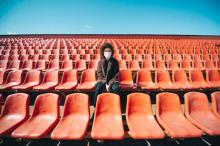
Numbers like 500,000, hard as they are to grasp, are necessary for grieving.
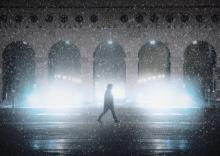
I’m latecomer to Lent. It wasn’t until I joined Sojourners in my first role as senior political director in 2004 that I learned from my Catholic colleagues the significance of this 40-day liturgical season in which we spiritually travel with Jesus through his fasting in the desert. In 2021, this time of reflection — so often marked by what we give up — comes amid what already feels like a dark, cold, and perilous winter.

THE OTHER DAY, during a Zoom call with my younger sister, I said something that sounded harsh—maybe even inappropriate. “You know, there’s a part of me that is honestly glad Mom isn’t alive during this pandemic.” She was quiet for a moment, “Yeah, I know what you mean.”
With untreated COPD (chronic obstructive pulmonary disease) and her radical hospitality, my mom would not have listened to public health officials’ guidance on the coronavirus. She would have visited her friends to check on them, taken meals to elderly neighbors, and watched over her grandchildren, all while smoking half a pack a day.
Mama, strong and resilient for more than 60 years, would have thought herself impervious. So, Mama would have caught the virus. And, because she and Daddy were tied at the hip, she would have passed it on to him. Daddy, with his emphysema, high blood pressure, a heart that endured two strokes, and a penchant for salty, fatty foods, is definitely vulnerable to COVID-19.
But Mama died from a sudden heart attack in February 2019. Daddy is at home during this global pandemic. Our brother cares for him and a nurse checks in. Daddy is safer and Mama is no longer suffering. We, their children, don’t have to navigate the heartbreak of losing parents during a global pandemic, of not being able to say goodbye properly.
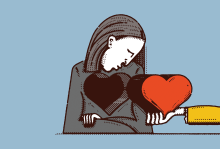
WHILE WE WERE not strangers to grief before the pandemic, these months have been something of a master class. “Each person’s grief is as unique as their fingerprint,” writes grief counselor David Kessler. “But what everyone has in common is that no matter how they grieve, they share a need for their grief to be witnessed.” We are witnesses to one another’s grief.
In our witness, we must acknowledge that loss is not equally distributed. Those of us with privilege have allowed this to happen, and we have much to answer for before God; there is so much that we must work to change. And we don’t have all the time in the world.
I hear empathic grief in parents who can’t spare their children the sudden disruption of their lives and the loss of rites of passage for which they have spent years preparing. And I hear it in children of elder parents who are sick with worry, and in family members of those deemed essential workers who, by choice or compulsion, risk their lives each day. I hear it in the business owners doing everything they can to keep employees on the payroll; in teachers, caregivers, advocates, and in my fellow clergy.
Grief propels us to do whatever we can to make things better and to offer hope and meaning for those we love. Spouses stand outside nursing-home windows with signs that say “I love you”; lines of cars drive by the house of a child celebrating a birthday or graduation; concerts are organized via Instagram; volunteer networks provide food and essential supplies to undocumented families. This is grief mobilized for good, helping us to do something to redeem the time we’re in.
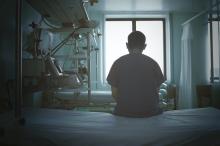
During this time of COVID-19, people are dying alone, away from their families and from priests or pastors who might ease their passing. You could no more shoehorn a dozen people into a hospital room than you should cram them unmasked into any enclosed space these days. A pastor or chaplain might be forced to visit the room remotely, to FaceTime last rites, so to speak.
